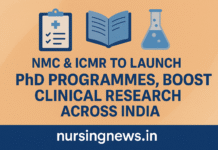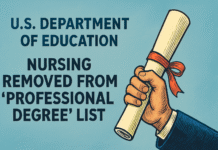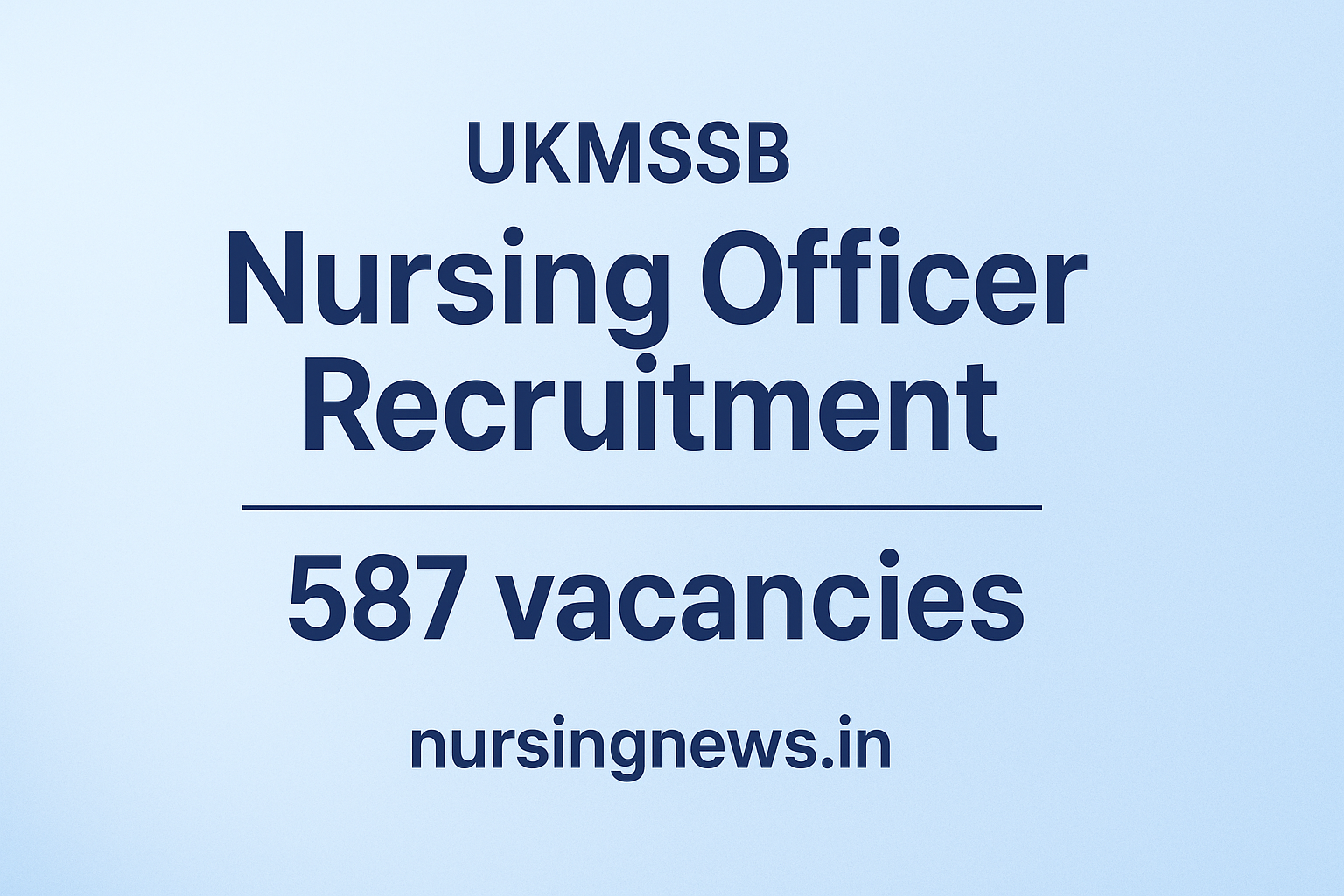The country is about to radically transform its nursing sector with the repealing of the Indian Nursing Council (INC) Act of 1947. This will be substituted with the new National Nursing and Midwifery Commission Bill, 2020. The authorities had previously asked for recommendations, inputs and suggestions for this bill from the general public and other stakeholders in the industry.
Sunday, the 6th of December, 2020, was the last day for the stakeholders and general public to dispatch their opinions and comments about the draft NNMC Bill, 2020 which has been proposed by the Union Ministry of Health and Family Welfare. The bill, once finalized and passed by lawmakers, will be replacing the Indian Nursing Council with the newly formed National Nursing and Midwifery Commission as mentioned.
TNAI recommends vital changes for NNMC Bill, 2020, seeks inclusion of associations
The TNAI or Trained Nurses’ Association of India has come out with several recommendations covering vital changes in the NNMC Bill, 2020. The association has dispatched its letter to Dr. Harsh Vardhan, the Union Health and Family Welfare Minister, regarding the circular that requested comments on the draft of the NNMC Bill from all industry stakeholders and the general public. In its letter, the TNAI has expressed its gratitude towards the Central Government for taking the initiative towards ensuring uniform nursing services and education throughout the country while thanking the authorities for introducing this brand new bill for enhancing and maintaining standards of nursing services and education in the process.
TNAI is the representative for all categories and types of nurses while other specialty institutions remain mostly restricted to a single sector. It has played a vital role in the implementation of the previous Indian Nursing Council (INC) and the president of TNAI holds a crucial position in the INC as well. This is the key reason behind official members of TNAI advocating for their inclusion within the purview of the National Nursing and Midwifery Commission. NNMC will thus become more accountable and representative if these associations are included according to TNAI and some other industry associations.
TNAI is a service-based entity with the following categories of members under its aegis:
- Nurses from State and Central Government hospitals
- Researchers
- Administrators
- Nurse practitioners
- LHV (lady health visitor)
- Auxiliary nurse midwife (ANM)
- Civil society representatives
- Autonomous organizations/bodies
- Railways
- Military nursing
- Missionaries
- Private hospitals and ESI
- Charities and others
TNAI has strongly recommended changes for superior improvement and functioning in this field. It has also held the view that authorities should consider these vital changes and try and get them implemented within the new bill itself.
Opinions of other stakeholders regarding exclusion of associations and other changes
The General Secretary of the Kerala Government Nurses Association or KGNA, T Subramanian, has already stated that several issues exist including the procedure of selection of members for this national commission. He added that in case the bill is finalized, there will be no process of election for choosing these members who will instead by directly nominated by the Central Government.
The commission will be framing policies for the sector while also regulating all standards for the governance of midwifery and nursing education and training activities in tandem with other practices including research. With the national level council being substituted by the new commission, councils at the state-level will become null and void or completely defunct as per industry stakeholders. A new state commission has been proposed to be set up within a year’s time. This will impact the federal system as per the President of the Kerala Nursing Council, Usha Devi who also added that all members of the subsequent state commission formed for replacing the state nursing council, being nominated directly by the Central Government.
Amongst 20-22 lakh nurses operating in India, 12 lakh come from Kerala according to Usha Devi who added that a majority of them work outside India or their home State. The big question, according to her, is how this new bill will be impacting their wellbeing. There is another major question according to her which revolves around nursing salaries. This is something over which nurses have previously conducted protests although it has not been fully addressed along with other details like the duration that nurses will have to work for getting included within the draft.
In this new commission that will be set up, members will be categorized and divided into 6 zones with every zone having 4-5 States in all. Two members will be selected from every zone with membership being given on a rotation basis for 2 years each for members from a particular zone. This indicates that Kerala representatives will be waiting for several years to find a place in the commission according to Subramanian. He also stated that nurses from several institutions which already have Central Government recognition will have membership of the Commission. This will only include a single institution from the State of Kerala, namely the Sree Chitra Tirunal Institute for Medical Sciences & Technology and three institutions in total from Southern India.
Subramanian also added that several associations have raised the issue pertaining to a single exit and entrance examination covering the nursing sector. Subramanian has also stated that the entrance examination which had previously been applicable till 10 years earlier was stopped later on, taking difficulties into consideration of financially deprived students for attending their coaching classes to prepare for the same. Instead, marks that are scored in the 10+2 examinations are to be considered in such scenarios. If the entrance examinations are revived, then it will again put financially backward students at a major disadvantage according to Subramanian while helping coaching institutions only. Usha Devi has also agreed that poorer students will be unable to compete in the newly proposed system. Subramanian has also added that there is an exit test where students will have to pass the same at the conclusion of their nursing courses.
Upon passing the exit examination, a student will obtain approval for registration within any nursing council, prior to commencing work as a professionally trained nurse. Details on conducting exit examination, number of times that students can appear for the same and other information have not been clearly mentioned in the draft legislation as per Subramanian. He has also stated that transferring powers to designated agencies for inspection of rate institutes and nursing colleges will come with its own share of issues. The Kerala Nursing Council has already kept the entire aspect within check and new agencies being designated may create a situation which is more conducive for corruption.
NNMC Bill welcomed strongly by United Nurses Association
The United Nurses Association or UNA, a representative nurses’ body in the State of Kerala, has however welcomed the establishment of the National Commission. The President at UNA, Shoby Joseph, has stated that they were all along seeking a united commission to be established throughout India which will make it more convenient for nurses transferring between States. In the current system, they will have to obtain membership in the nursing council at the State where they are shifting and cancel the one which they held in the State which they are departing from. This may often be a grueling affair according to Shoby Joseph.
However, with a national commission in place, this aspect will be covered according to Joseph. Yet, the UNA (United Nurses Association) has still requested additional clarity on job descriptions, salaries and other information pertaining to nurses which have not been covered in the draft legislation till date. The Government has been notified about the same accordingly as per Joseph.
Some other aspects raised by various stakeholders
Along with the issue of inclusion of various nursing associations and other bodies within the purview of the national commission, several stakeholders have raised the following issues over the NNMC Bill.
- Centralization Issues- The NNMC Bill gives powers to the Central Government for nominating a majority of members for the regulatory bodies that will be setup under the same. Aided by a search and selection committee of 7 members which will also be nominated by the Central Government, it will possess power for selecting the secretary, chairperson and members for the national nursing and midwifery commission along with the president and full-time members at the four autonomous boards as well. There will be no representation for members who are elected by the nursing associations and fraternity which may hinder the role of midwifery and nursing professionals for regulating their own profession.
- State-wide representation- Unlike the previous INC which had elected representatives being present from every State council, the newly proposed commission has restricted state-wise representation throughout 6 zones based on the zonal distribution for union territories (UTs) and States. The nursing and midwifery advisory council is the sole body under the NNMC Bill that has representation from all Indian States. Yet, members of the advisory council will not be elected by the midwifery and nursing professionals. Rather, they will have nomination from the State and Central Governments. The council will be an advisory entity without any power to take decisions.
Dr. Amar Jasani and his opinions
Dr. Amar Jasani has taken a rather skeptical stance regarding the draft NNMC Bill. He has talked of how the earlier regime created an opinion that medical councils were under the widespread control of corrupt stakeholders while opining that people at the council level also had representation in the medical associations. Historically, the councils were established to recognize the occupation turning into a profession at the societal level according to Dr. Jasani. Here are his key insights:
- Nurses do not have any representation in the Indian Council for Medical Research with paucity of funds hindering nursing research activities as well.
- He talked of midwives and their issues, advocating the establishment of a separate Bill or Act for midwifery.
- He talked of how women’s organizations and reproductive health based NGOs should be included in the campaign for the above along with mobilizing support externally for amending the bill.
- Dr. Jasani stated that with the Government holding a majority in the Lok Sabha, bills are passed quickly and this is how the Medical Council bill got passed without extensive discussions relating to the same.
- He held that midwifery is not being perceived seriously owing to staunch opposition from gynecology associations. They have competing interests in this field while having concerns relating to community delivery work as well.
- Dr. Jasani asked for the creation of a comprehensive strategy by all nursing associations and stakeholders, covering the demand for including midwifery separately within the aegis of the NNMC Bill as sought.
- He called for upholding ethics in the community while talking of the pressing need for greater independence and autonomy in the nursing profession/sector as well. He also talked of how nursing deserves adequate social status along with its own distinct governing body as well.
- He posed the question of whether there are proper codes of ethics for nursing professionals while also enquiring whether a council has powers for taking action if there is any future interference with the profession.
- He emphasized on the three key occupational aspects of the profession, i.e. behavior with clients, behavior with other professions which are inter-related and also obligations towards the civil society as a whole. The second aspect is where Dr. Jasani felt that a concerted effort may be made for gaining higher autonomy with every method of interference considered a gross violation of professional ethics in this regard.
- If the commission comes into existence, then Dr. Jasani remained skeptical about the code of ethics being formulated for the autonomous board covering ethics in the sector.
- There will be compromises with goals pertaining to public health in case profiteering is enabled for health and nursing education.
- The American model should not be followed where top players are minting money and nurses are becoming slaves to big corporate hospitals on account of their high debt on account of educational costs. This should be avoided with the NNMC Bill.
Dr. Jasani, who is widely respected in the medical field, also stated that if the commission bill becomes a law, there should be a strategy to interact with the commission and try to push some of the criteria like code of ethics, criteria like how the nursing institutions will be regulated and controlled and so on.
Opinions expressed by other luminaries
The Nursing Teachers Association, India, organized its 3-day event related to the NNMC Bill, 2020, based on queries that were received via Google forms. These queries were discussed with experts in the field of nursing between 30th November and 2nd December, 2020. Under the aegis of this event, discussions were organized with several industry luminaries.
Professor Dr. Roy K George has started that the bill and subsequent measures should aim at solving trust issues and issues relating to women’s empowerment above all else. He also talked about the autonomous boards proposed by the Commission, highlighting the importance of a dedicated and separate board for nursing service and quality of nursing services. He opined that this board should be fixing the qualifications needed for nursing professionals at various levels, inspecting overall working conditions and also covering minimum requirements in terms of nursing salaries. Dr. George also added that the procedure of formulating the NNMC Bill was executed after taking into account feedback throughout State and city branches of leading associations.
Dr. Bimla Kapoor has stated that the Government is already being entreated to raise the bill in the next session of Parliament along with releasing the official Gazette notification by early January or February, 2021. Dr. Kapoor also stated that a completely democratic process was adhered to with the bill being put up for public comments as well while clarifying that there is a concerted effort being made to give the same powers to the State Nursing and Midwifery Registration as the National Nursing Midwifery Commission. However, she also added that the former will handle queries mostly. The commission has not given any demarcation between midwifery and nursing according to her and this will only be applicable whenever midwifery associates and practitioners are being discussed. This will be featured in the Act whenever the Academic Council takes the decision about the Midwifery Council and other regulations and policy-framing, enabling them to practice seamlessly. She talked of how it will be put together by the Government post receipt of all suggestions from stakeholders.
Dr. Maria Therese also provided her views, talking of the NNMC Bill and how there should be more clarity regarding fixing salaries for nursing professionals and also how nurses were being perceived in a subservient role to medicos. She also talked of the areas that need to be highlighted including basic insurance for nursing professionals, pension schemes and equal salary structures across the private and Government healthcare sectors as well. She also talked of how the welfare of students in the field should be emphasized upon since these students are already dealing with medical patients with higher vulnerability for contracting infections amidst a pandemic situation. She stated that there also remains the issue of several private clinics appointing nursing officers who are unqualified and hoped that this aspect will be addressed by the upcoming NNMC Bill.
Recent opinions and updates on NNMC Bill
Kaveri Mayra, Midwifery and Nursing Researcher, has tweeted stating how she is proud of the team at WGH (Women in Global Health India) for sending out their statement to the Ministry of Health and Family Welfare, India, in support of nurses and midwives and ANMs. WGH has advocated for the bill to be called National Nursing Commission Bill with a separate section dedicated to midwifery. They have also stated that the bill should state the scope for a direct entry degree course for midwifery education, independent from nursing. The organization has also stated that there should be scope of creating midwifery councils at the State level. Clarifications have also been sought on all designations mentioned for the Commission. Proper representation of nurses, midwives and other experts in the Commission and its scope has also been asked for along with a host of other recommendations and suggestions for changes covering research, designations and regulation measures for the private sector as well.
Midwife, researcher and activist Portia Shanduka has seconded Kaveri, stating that midwifery autonomy is highly required since midwives are independent practitioners. A tweet has also been shared where it says that while midwifery has been mentioned approximately 365 times, there is no proper content pertaining to regulation of midwives and midwifery in the country. The WGH and other organizations feel that this should be a dedicated nursing bill with a separate midwifery bill or there should be selection of teachers, scholars, practitioners and researchers advocating midwifery for several decades with regard to developing midwifery content present in the NNMC Bill.
Dr. Swati Rane has shared some of the opinions previously formulated by nursing practitioners and industry associations in Kerala. The provision- A person aggrieved by the decision of any of the above boards may prefer an appeal to the commission has been highlighted as potentially problematic according to Usha Devi since it will hinder the right to approach any legal court for infringement of rights. Impartial action and delivery of justice has been questioned for its feasibility with such provisions. Another bone of contention is that state commissions will not possess powers and autonomy that current state nursing councils possess. All 29 Indian states currently have their councils and registered nurses cast votes for election of members. The new system will have just elected members, thereby hindering representation of midwives and nurses in the country.
Even foreign national Sally Pairman has tweeted her agreement to Kaveri Mayra’s tweet and the points raised by the WGH. She has stated that the bill will not lead to a strengthening of midwifery in the country. It will continue the practice of conflating midwifery and nursing, thereby leading to poor quality of care for women in the country and their babies as well.
The much-debated and widely discussed NNMC Bill has opened up a cauldron of views, opinions, points and counter-points. Several changes have been highlighted by various industry stakeholders including the non-inclusion of state associations and other bodies within the Bill, the procedure behind Central nomination of members, autonomy issues, salary structure fixation and more. Several changes have also been recommended to the Government in writing. Several stakeholders have also talked about how the NNMC Bill will herald a new dawn for the nursing sector, bringing in more uniformity, better education and service standards and better working conditions as well. With the deadline for sending public comments or opinions to the Central Government expiring on 6th December, 2020, it remains to be seen how the Government assimilates all opinions received for the NNMC Bill. Stakeholders and the healthcare sector expect the process of amendments and changes for the bill to be initiated prior to the same being raised for discussion in the Houses of Parliament en route towards becoming a law.








